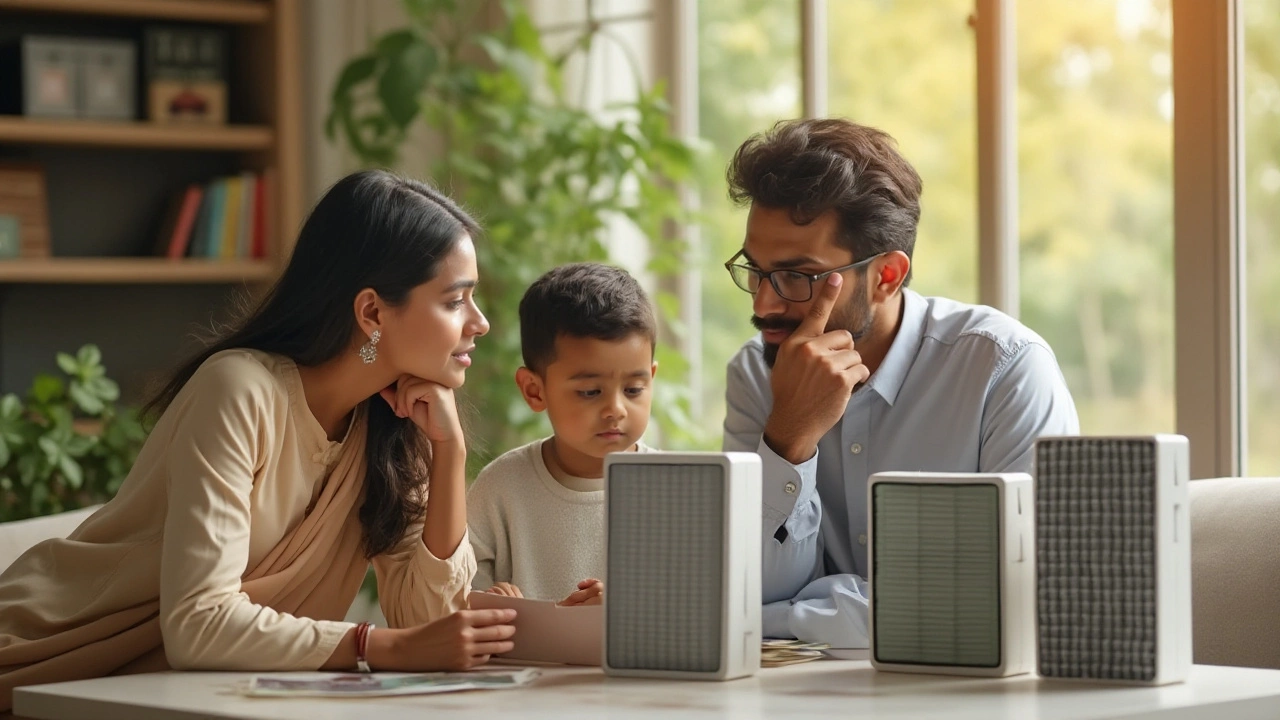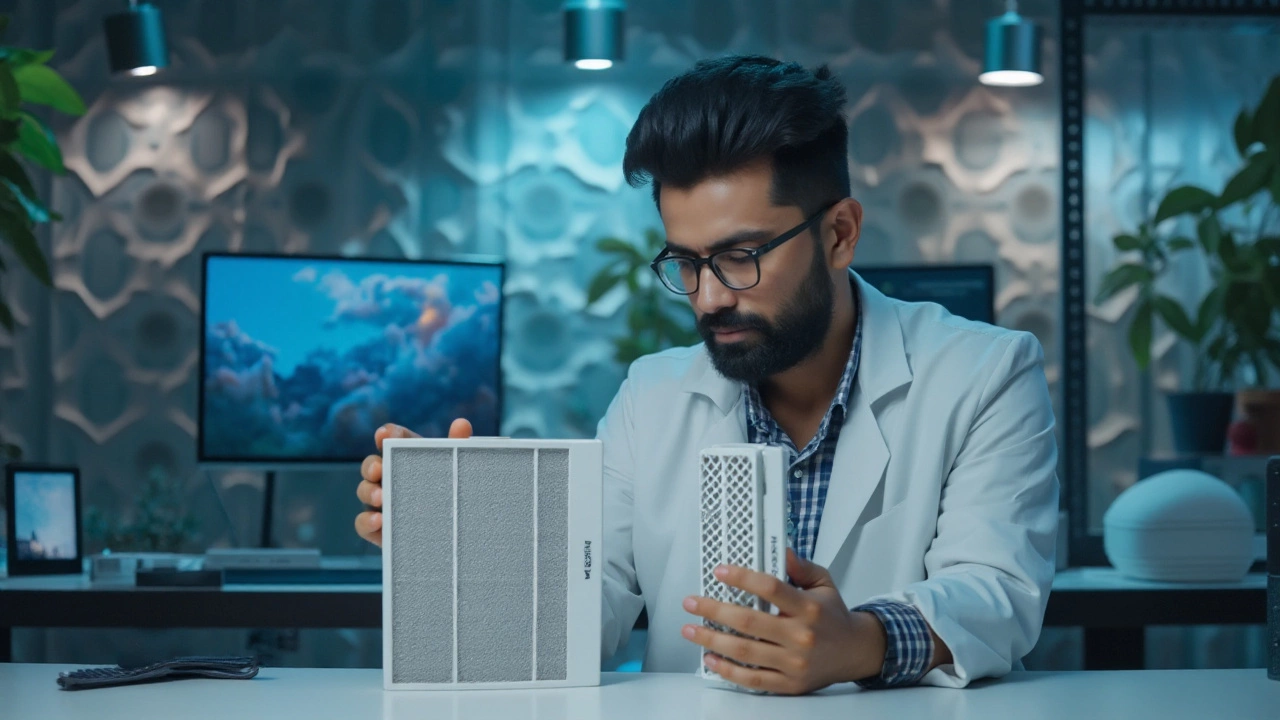 Jan, 16 2025
Jan, 16 2025
When faced with selecting an air filter, most of us wonder if the hefty price tag of some options truly reflects superior performance. With so many types available, it's easy to feel overwhelmed. But how much do those extra dollars actually bring to the table? Dive with me into this world where science and marketing often collide.
Whether you're dealing with seasonal allergies or just trying to improve the indoor air quality for your family, understanding what you're really paying for can make a big difference. Let's explore the intricacies of air filters and uncover whether spending more is really the secret to breathing easier at home.
- Understanding Air Filter Types
- Price vs. Performance: A Comparative Look
- The Science of Filtration: What Expensive Filters Claim
- Real User Experiences and Expert Insights
- Tips for Choosing the Right Air Filter for Your Home
Understanding Air Filter Types
When stepping into the realm of air filters, it's like unlocking a hidden world of options, each promising to outdo the other. For those not familiar, it can be a twisty labyrinth. But fear not! It turns out, knowing your HEPA from your electrostatic can really make or break your home's indoor air quality. Navigating through these, you start with the High Efficiency Particulate Air (HEPA) filter, a household name for many allergy sufferers. HEPA filters must trapping 99.97% of particles as small as 0.3 microns. That's nearly invisible to the eye. No wonder they're praised in environments where allergens or fine particles are unwelcome guests.
Beyond the HEPA, you have the pleated filters. Capturing more particles than flat-panel filters but still coming at varied performance levels. They offer a balance between effectiveness and price for many households. Electronic and electrostatic filters are clearly not just science jargon. They charge particles so they stick to their filter. However, they can generate ozone, which isn't as great as it sounds. Nonetheless, for many, this trade-off is often ignored for the filter's miraculous capture rate. Adding to the show's complexity are activated carbon filters. They are a powerhouse against smells and volatile organic compounds. Whilst they might not be the first choice for dust and pollen reduction, the unique benefits of activated carbon keep them a must-have for specific needs.
Factors Impacting Performance
When evaluating which air filter type is right for your home, performance is influenced by several factors. The Minimum Efficiency Reporting Value (MERV) rating helps to identify a filter’s efficiency, with ratings spanning from 1 to 16. A higher rating means a finer filtration, but it could also impede airflow and reduce energy efficiency. Understanding the balance here is essential for optimizing air quality without spiking utility bills. As quoted by Dr. Jonathan Samet from the American Thoracic Society,
"Filters are a fundamental component in the effort to combat air pollution inside the home, as long as the correct type is used for the particular context."It's clear, getting the right air filter type can profoundly impact your household’s air quality and, consequently, its wellbeing.
Price vs. Performance: A Comparative Look
It's easy to assume that a higher cost directly translates into superior performance when it comes to air filters. Many folks see a hefty price tag and equate it with quality, but the truth might surprise you. Let's dig a bit deeper into how pricing aligns with performance, or if it does at all. Various brands and models on the market range dramatically in cost, from budget options under $20 to high-end filters soaring over $100. But is this stark difference in pricing reflective of an equally significant gap in their effectiveness at cleansing the air we breathe?
Several factors dictate the cost of an air filter: the materials used, the brand reputation, and the efficacy of filtration technology. For instance, high-efficiency particulate air (HEPA) filters, renowned for capturing 99.97% of particles as small as 0.3 microns, often come with a higher price. They promise to rid your environment of allergens, dust, and other pollutants efficiently. However, not all HEPA filters are created equal, and the presence of the acronym on packaging doesn't guarantee a premium product. Marketing plays a significant role here. While some expensive filters provide superior filtration, others might simply exploit the reputation without offering the same level of quality.
"Price isn't always a direct reflection of performance," says Dr. Anne Marie Helmenstine, a noted chemist and educator, "It's crucial for consumers to investigate beyond the cost and understand the specifications and real-life efficiency of the filter."In an insightful comparison by consumer reports, testers found that mid-range filters often perform just as well, if not better, than their pricier counterparts in everyday scenarios. This finding surprised many who had long believed that cost was a reliable barometer for quality.
Consider also the type of filtration needed for your home. An environment with high pollution or numerous pets might indeed benefit from more advanced, costly technology. Yet for others, particularly those living in less polluted areas or with good overall ventilation, a cheaper option might suffice. It's about matching the filter's capabilities with the specific demands of your household. These insights remind us that while price is a factor, it's not the lone determinant of quality.
To help decide what's best for your home, it's useful to look at third-party reviews or certifications. Organizations like the American National Standards Institute (ANSI) and the Institute of Inspection, Cleaning and Restoration Certification (IICRC) offer unbiased assessments that can provide a clearer picture. Additionally, checking the Minimum Efficiency Reporting Value (MERV) rating can be enlightening, as higher MERV ratings correspond to finer filtration capabilities. Typically, residential settings benefit from filters in the range of MERV 8 to 13.
While it's tempting to be swayed by marketing promises and sleek packaging, remember that the best indoor air quality doesn't always come with a steep price. Instead, focus on the specific needs of your home, and be prepared to weigh the pros and cons between cost, filter effectiveness, and durability. This approach ensures that you're making an informed choice that prioritizes clean air without necessarily stretching your budget. After all, an informed buyer always makes the smartest choices.

The Science of Filtration: What Expensive Filters Claim
The air filter market is a complex world where scientific innovation meets consumer skepticism. With a spectrum of brands positioning themselves as the solution to every pollutant problem imaginable, it's crucial to decipher what expensive air filters genuinely offer. At the core of these lofty claims lies the High-Efficiency Particulate Air (HEPA) technology, which promises to trap particles as small as 0.3 microns with up to 99.97% efficiency. This is a bold promise, especially when contrasted with standard fiberglass filters that capture less than 30% of such particles.
These high-performance filters often boast multiple layers of filtration materials such as pleated filter media, activated carbon granules, and even antimicrobial treatments. Each component plays a distinct role: pleated media traps larger particles while activated carbon seeks to absorb odors and volatile organic compounds (VOCs). This layered approach, manufacturers argue, provides a comprehensive solution that basic filters simply cannot match. However, where the science ends and marketing begins remains a topic of debate.
Some claims are undoubtedly backed by solid evidence. For instance, a study conducted by the Journal of Environmental Health found that air filters with high MERV ratings (Minimum Efficiency Reporting Value) can significantly reduce indoor air pollution levels, including fine particulate matter. Yet, as enticing as these scientifically-supported stats might be, the effectiveness of a home air filter also largely depends on proper installation and regular maintenance.
"While higher-grade air filters can enhance indoor air quality, it's crucial for consumers to adhere to maintenance schedules," advises Dr. Susan Nyberg, a researcher in respiratory health. "Even the most expensive filters become ineffective if not replaced regularly."
It's easy to get caught up in the allure of advanced filter technology, but seeing improvements in indoor air quality depends on several factors, including the specific household needs and how well users follow guidelines. For those grappling with respiratory issues or living in high-pollution areas, investing in expensive filters might be a justified expense. However, buyers should weigh the science carefully, being mindful of the claims made and inspecting product details like filtration efficiency ratings and certifications.
Interestingly, the energy penalty of using an expensive filter must also be considered. Many high-efficiency filters require more powerful air handling systems to maintain optimal airflow, which can lead to increased energy consumption. Balancing the cost of the filter with its potential to raise the electricity bill receives less attention yet plays a significant role in assessing the true value offered by these products.
Real User Experiences and Expert Insights
The journey to finding the best air filter can often be paved with a gamut of personal stories and professional advice. Many homeowners find themselves pestering friends and searching online forums for real-life experiences with various air filters. Surprisingly, the personal accounts can be as varied as the products themselves. Take Maria, a resident of busy Manhattan, who swears by the outstanding difference a high-end filter made in her high-rise apartment. "Before upgrading, my allergies were relentless," she recounts, "but now, my airways have found peace!" But is this improvement due to the filter's capabilities or the placebo effect, often amplified by a significant price tag?
Delving deeper into expert opinions, it's clear that not all costly filters deliver on their promises equally. Dr. Sarah Collins, an environmental scientist, notes, "Many expensive models do pack advanced filtration technologies like activated carbon and HEPA filtration. However, users should be cautious about assuming a direct correlation between cost and effectiveness." She highlights that much depends on individual conditions, such as the home's air quality needs and the presence of pets or smokers. It's important to match the filter specification with these specific requirements, sometimes irrespective of price.
On the flipside, Tony, a budget-conscious dad from Texas, reports that his reasonably-priced filters serve his household just fine, maintaining good indoor air quality without stretching his wallet thin. His experiences shed light on occasions where simple, consistent maintenance can balance what pricier options may offer. According to a Consumer Reports study, some mid-range filters performed nearly as well as top-tier ones, especially in dust and pollen removal, challenging the notion that higher expense naturally means better air.
"The brand shouldn’t blind you. Understand what your space needs more than the latest trend," advises Robert Dunn, a renowned HVAC consultant.
A blend of user experiences emphasizes that choosing the right filter isn't determined by the highest price tag but by the specific performance fit for one's environment. Experts consistently reiterate this, urging consumers to look beyond marketing claims and consider factors like airflow resistance and specific filtration technologies. As technological advancements continue to flourish, it's likely we'll see the permeability between price and quality redefined, offering enhanced choices for all.

Tips for Choosing the Right Air Filter for Your Home
Choosing the perfect air filter for your home involves more than just grabbing the first one that catches your eye. The process can be a bit like picking a new pair of shoes; it has to fit just right for it to be comfortable and effective. With the vast array of options available on the market, it can be overwhelming to decide which filter is ideal. Start by understanding the air filters metrics that matter. Look for the MERV rating, which stands for Minimum Efficiency Reporting Value. This rating scales from 1 to 20 and gives you an idea of how effective a filter is at trapping particles. For residential use, a MERV rating of 8 to 13 is generally recommended unless specific needs demand higher efficiency, like severe allergies or respiratory conditions.
When considering costs against your indoor air quality needs, note that expensive filters are typically designed to filter finer particles or accommodate larger homes. However, that doesn't mean cheaper options are ineffective—they just might not deal with smaller particles such as smoke or bacteria as efficiently. A notable fact is that HEPA filters, although challenging to find for home systems, are incredibly efficient and remove around 99.97% of airborne particles that are 0.3 microns or larger. Should you consider HEPA grade, know it's often used in professional settings such as hospitals for a reason. Always balance your budget with your home’s specific air quality requirements.
Consider the filter's lifespan too, as some need more frequent replacement than others, potentially increasing long-term costs. It's said that expensive air filters can offer extended use, but that varies tremendously based on usage and the environment. For instance, homes with pets or those near construction sites might require frequent changes to maintain optimal air quality. Brian Lampson, a renowned HVAC specialist, once noted,
"Don’t just judge an air filter by its price tag or manufacturer’s claims. Understand your home’s needs and observe how long the filter can genuinely give you the clean air you desire."
Finally, think about additional features like odor control or activated carbon layers, especially if smells or smoke are concerns in your area. Some filters come with built-in odor control layers that cater specifically to odors from cooking, tobacco, or pets. If allergies are an issue, allergen-specific filters could be invaluable. These are designed to target microscopic particles that are typically allergy triggers. Start by listing your priorities and match those against what the filters offer; you'll be able to confidently choose a filter that doesn't just promise clean air but delivers it effectively.